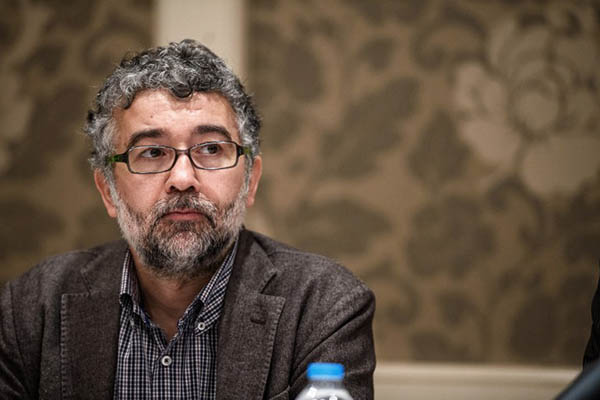
RSF representative Erol Onderoglu. Ozan Kose—AFP
Reporters Without Borders representative, two intellectuals charged over campaign of solidarity with pro-Kurdish newspaper.
Turkey stepped up its crackdown on the media Monday, detaining and charging the local representative of international rights group Reporters Without Borders (RSF) and two intellectuals for “terrorist propaganda.”
RSF representative Erol Onderoglu, journalist Ahmet Nesin and rights activist and academic Sebnem Korur Fincanci were charged for taking part in a campaign of solidarity with a pro-Kurdish newspaper in May.
“The prosecutor in our case demanded that we be charged and jailed for terrorist propaganda,” in support of the Kurdistan Workers’ Party (PKK), an armed Kurdish rebel group that Turkish forces are battling in the country’s southeast, Onderoglu told AFP by phone.
RSF swiftly condemned the prosecution and pre-trial detention of the three, who in May had taken symbolic control of the pro-Kurdish newspaper Ozgur Gundem, which has been in the crosshairs of the Turkish authorities for years.
“This is another dark day for media freedom in Turkey,” said Johann Bihr, the head of RSF’s eastern Europe and central Asia desk, in a statement.
About 100 people rallied in support of the three outside the court in Istanbul where they made a brief appearance on Monday. “We will not bow to pressure,” the protesters chanted.
The international community has voiced increasing alarm about the erosion of press freedoms in Turkey under President Recep Tayyip Erdogan. The Organization for Security and Cooperation in Europe said it was “appalled” by the detention of the three and called for their release.
“The authorities should drop the charges and stop using imprisonment as a way to fight differing voices,” said Dunja Mijatović, the OSCE media freedom representative, in a statement.
The arrests come despite the European Union pressuring Ankara to stop prosecuting academics and journalists and to change its terrorism laws, one of the conditions of its controversial migrant deal with Turkey that promises visa-free access for Turks, among other incentives.
Turkey is waging a large-scale military offensive against the PKK in the Kurdish-majority southeast, and has clamped down on those it accuses of supporting what it and its Western allies consider a terrorist group. Onderoglu has represented RSF in Turkey since 1996, while Nesin is a well known writer and journalist, and Fincanci is an academic who heads the Human Rights Foundation of Turkey.
Several thousand people including journalists, politicians and the occasional celebrity, have faced prosecution for allegedly insulting Erdogan, who has shown little tolerance for criticism since becoming president in 2014 after more than a decade as prime minister.
RSF ranks Turkey 151st out of 180 countries in its latest World Press Freedom Index for 2016.
Ankara has also taken a hard line against Kurdish activists after the breakdown last year of a two-year truce between the state and the PKK. Last month, parliament adopted a highly controversial bill that would lift immunity for dozens of pro-Kurdish and other M.P.s and could see them evicted from the legislature.
The E.U. deal agreed in March seeks to enlist Ankara’s help in stemming the flow of migrants crossing from Turkey’s shores into E.U. member Greece, but Turkey must meet a July 1 deadline to reform its terrorism laws if it is obtain visa-free travel to Europe in return.
Erdogan has refused to amend the laws, saying Turkish authorities see “no difference” between individuals carrying weapons or indulging in “terrorist” propaganda.
The Kurdistan Freedom Falcons (TAK), a splinter group of the PKK, has waged several attacks in Ankara and Istanbul in what it said was revenge for the army’s offensive against Kurdish militants. Over 40,000 people have been killed since the PKK took up arms in 1984 demanding an independent state for Kurds. Since then the group has narrowed its demands to greater autonomy and cultural rights.
On Sunday, Erdogan told reporters that 7,000 PKK rebels had been “neutralized” and 600 members of the security forces killed since the conflict flared again in mid-2015.
